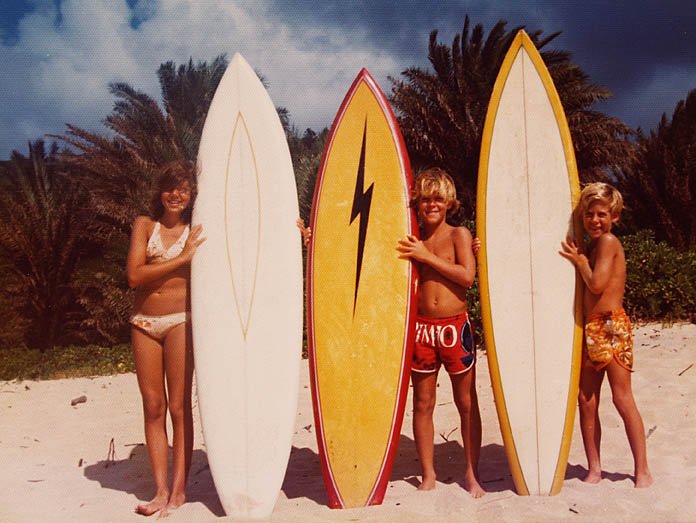The idea is simple: dive down, hold your breath, wait motionless for a fish to swim by, and then spear it.
As I progressed with my spearfishing experiment as a budding 13-year-old waterman, I was diving in my home waters in a cove off of the west side of Maui, Hawaii, in about 20 feet of water.
By my third or fourth dive down, I still hadn’t caught anything, but I was determined. I dove down again, holding my breath, equalizing my ears on the way down. I got to the bottom of the ocean floor, about 20-feet deep. I remained there, perfectly still—I waited.
The seconds ticked by with no fish in view, my oxygen slowly evaporating. I could see several fish in the distance, but none of them came my way. “Relax,” I told myself. “The calmer I am, the less oxygen I will use. The slower my heart rate is, the longer I can stay down.”
Suddenly, from behind my back came a beautiful one-foot-long Triggerfish. Humuhumunukunukuāpuaʻa is her Hawaiian name. She had a chubby mouth, and the top of her upper lip was the perfect shade of blue. Teal stripes ran across her head and yellow-orange markings down her back. She propelled herself using waving motions from her dorsal fins. She came from behind my left side, unseen, stopping directly in front of me—right in front of my face—at eye-level.
My right arm was outstretched, with the spear in position in front of me. But the spear was way too far forward to be useful to spear her. She was, as the kids these days would say, all up in my grill.
I couldn’t tell if she was friendly or aggressive. She was so close to me that it momentarily threw me. I didn’t have a chance to organize myself to get a shot off. Either that or I actually didn’t want to.
Her delicate fins fluttered like twin-engine helicopter blades. Her mouth was slightly open, her lips pursed. She looked as though she was trying to vocalize something. I might have even heard a faint grunt, like a pig. She looked like a real lady—slightly regal.
Instead of swimming away from me, she just hovered there, looking at my face, looking into my mask. My wide eyes must’ve looked wild; I was stunned. She was so close that I could probably reach out and grab her.
But I didn’t. I didn’t want to.
We both stared motionless into each other’s eyes. Even in retrospect, I can’t quite make sense of it.
The mutual recognition we had with each other was equal to the kind of moments I had when I would meet a person or a dog for the first time. There you are—here I am. We see each other. I mean, we really connected.
I came to the cove to kill a fish. But this magnificent Triggerfish came over to me—to make an introduction. Little did I know that this introduction was actually with my own self.
Instantly, as I broke the surface and filled my lungs with oxygen, everything was different. I knew who I was, and I knew who I wasn’t. I also knew who the ocean was and who she was not.
I was done spearfishing for the day. I was done spearfishing for good.
How could I describe the strange encounter to friends and family, how close I was, physically, to the Triggerfish, how close I felt to her? Considering those conversations, I downplayed the heart-to-heart part of the experience. I wanted to play it cool; I didn’t want to be thought of as a wuss.
There are many statues in ocean countries around the world of men throwing spears into the ocean, catching fish. Those statues are made of steel and bronze. They are proud-looking. Strong. There are fewer statues of Gandhi in the world—fewer statues of men holding walking staffs—feeling empathy, practicing nonviolence.
I, too, aspired to be like Duke Kahanamoku, not Gandhi. I didn’t even know who Gandhi was at the time.
At the moment I got out of the water with the Triggerfish, I knew things were different. The Triggerfish was a brave, calm, and secure individual. In her, I saw someone who knew what they were doing and someone who knew what they wanted to do.
What I saw was someone with whom I am worthy of sharing the ocean. What I didn’t see was something that I wanted to take from our ocean.
And what I felt was a kinship with her. I felt a connection. I felt compassion for her, although at the time, I didn’t know what compassion truly was. I felt sympathy, humility, remorse. I felt like a small person for even holding the intention of taking her life in the first place.
The Hawaiians taught me how to appreciate and understand Mother Nature. They taught me how to read her waves. They taught me how to surf like royalty—proud, yet humble. They taught me what Aloha means:
Aloha ‘aina, aloha kai. It means love the land, love the sea, and only take what you need.
I’ve not eaten fish since that day. Only take what you need.
Fish are not just a commodity, not just pieces of meat. I see them for the individuals they are. They are not objects. Fish are social creatures, good-natured, sometimes shy, sometimes curious, sometimes aggressive—just like me.
My affinity for the ocean is not unique. Humans come from water. We are made most mostly of water. We are born to connect with her.
The message I was telling myself at the age of 13 was constructed on a lie. I didn’t need to “man-up.”
A soft heart is a good thing. A soft heart is a natural thing. Compassion and empathy are normal; they are as normal and natural as the water itself.
Toughening up my heart was not, and still is not, the answer. My aquatic self, whose heart was touched by a beautiful fish, guided me at that moment, and still guides me today.
Never turn your back on the ocean.
In Hawaiian wisdom, I’ve heard it described something like this, “We never turn our back on our family. The ocean is family. We never turn our back on her.”
I’m glad I didn’t turn my back on her that day. I’m glad I didn’t turn my back on myself that day, either. Today, I could never imagine spearing a fish—someone I consider to be a friend, a family member, an ocean being, a fellow swimmer, a surfer, and a fellow earthling.
Love the land, love the sea, and only take what you need.
I want to take from the sea only what I need. And the only need I have from her is her love. She is family. She is the giver of life, and I am eternally grateful for her love. That is all I wish to take. That is all I need to take—her love.
~







Read 6 comments and reply